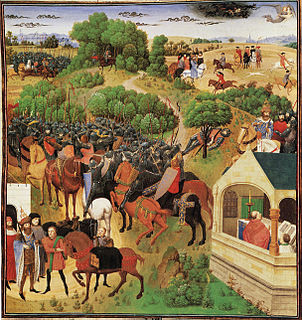 W
WThe chanson de geste is a medieval narrative, a type of epic poem that appears at the dawn of French literature. The earliest known poems of this genre date from the late eleventh and early twelfth centuries, before the emergence of the lyric poetry of the trouvères (troubadours) and the earliest verse romances. They reached their highest point of acceptance in the period 1150–1250.
 W
WAmis et Amiles is an old French romance based on a widespread legend of friendship and sacrifice. In its earlier and simpler form it is the story of two friends, one of whom, Amis, was sick with leprosy because he had committed perjury to save his friend. A vision informed him that he could only be cured by bathing in the blood of Amiles's children. When Amiles learnt this he killed the children, who were, however, miraculously restored to life after the cure of Amis.
 W
WBevis of Hampton or Sir Bevois, was a legendary English hero and the subject of Anglo-Norman, Dutch, French, English, Venetian, and other medieval metrical romances that bear his name. The tale also exists in medieval prose, with translations to Romanian, Russian, Dutch, Irish, Welsh, Old Norse and Yiddish.
 W
WThe Canso d'Antioca was a late twelfth-century Occitan epic poem in the form of a chanson de geste describing the First Crusade up to the Siege of Antioch (1098). It survives only in a manuscript fragment of 707 alexandrines preserved in Madrid.
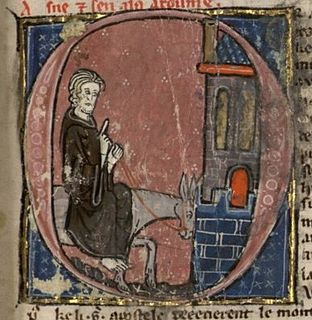 W
WThe Chanson d'Antioche is a chanson de geste in 9000 lines of Alexandrins in stanzas called laisses, now known in a version composed about 1180 for a courtly French audience and embedded in a quasi-historical cycle of epic poems inspired by the events of 1097–99, the climax of the First Crusade: the conquest of Antioch and of Jerusalem and the origins of the Crusader states. The Chanson was later reworked and incorporated in an extended Crusade cycle, of the 14th century, which was far more fabulous and embroidered, more distinctly romance than epic.
 W
WChanson de Jérusalem or Song of Jerusalem is a 12th century French epic poem celebrating the 1099 Siege of Jerusalem by Christian crusaders during the First Crusade.
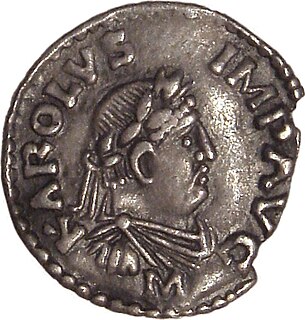 W
WCharlemagne or Charles the Great, numbered Charles I, was the King of the Franks from 768, the King of the Lombards from 774, and the Emperor of the Romans from 800. During the Early Middle Ages, he united the majority of western and central Europe. He was the first recognised emperor to rule from western Europe since the fall of the Western Roman Empire around three centuries earlier. The expanded Frankish state that Charlemagne founded is called the Carolingian Empire. He was later canonised by Antipope Paschal III.
 W
WFierabras or Ferumbras is a fictional Saracen knight appearing in several chansons de geste and other material relating to the Matter of France. He is the son of Balan, king of Spain, and is frequently shown in conflict with Roland and the Twelve Peers, especially Oliver, whose prowess he almost rivals. Fierabras eventually converts to Christianity and fights for Charlemagne.
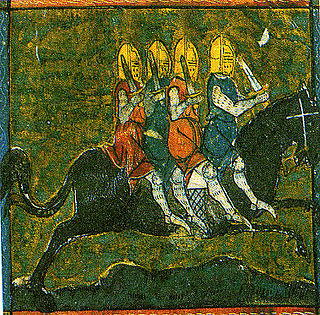 W
WThe Four Sons of Aymon, sometimes also referred to as Renaud de Montauban is a medieval tale spun around the four sons of Duke Aymon: the knight Renaud de Montauban, his brothers Guichard, Allard and Richardet, their magical horse Bayard, their adventures and revolt against the emperor Charlemagne. The story had a European success and echoes of the story are still found today in certain folklore traditions.
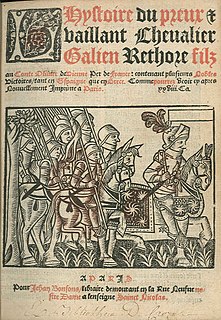 W
WGaliens li Restorés, or Galien le Restoré or Galien rhétoré, is an Old French chanson de geste which borrows heavily from chivalric romance. Its composition dates anywhere from the end of the twelfth century to the middle of the fourteenth century. Five versions of the tale are extant, dating from the fifteenth century to the sixteenth century, one in verse and the others in prose. The story—which is closely linked to the earlier chansons de geste Pèlerinage de Charlemagne and The Song of Roland —tells of the adventures of Galien, son of the hero Olivier and of Jacqueline, the daughter of the (fictional) emperor Hugon of Constantinople.
 W
WGirart de Roussillon, also called Girard, Gérard II, Gyrart de Vienne, and Girart de Fraite, was a Burgundian chief who became Count of Paris in 837, and embraced the cause of Lothair I against Charles the Bald. He was a son of Leuthard I, Count of Fézensac and of Paris, and his wife Grimildis.
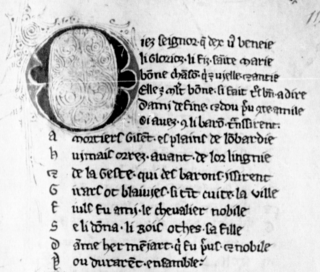 W
WJordain de Blaivies is an Old French chanson de geste written in decasyllables around 1200. It is an adventure story, largely inspired by the ancient story of Apollonius of Tyre. It survives in a single manuscript.
 W
WRenaud de Montauban was a fictional hero and knight who was introduced to literature in a 12th-century Old French chanson de geste known as Les Quatre Fils Aymon. The four sons of Duke Aymon are Renaud, Richard, Alard, and Guiscard, and their cousin is the magician Maugris. Renaud possesses the magical horse Bayard and the sword Froberge.
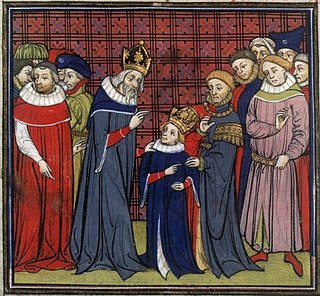 W
WLi coronemenz Looïs is an anonymous twelfth-century Old French chanson de geste. It is sometimes attributed to Bertrand de Bar-sur-Aube and dated 1137. The first modern critical edition of the text was published in 1888 by Ernest Langlois under the title Le Couronnement de Louis.
 W
WRenaud de Montauban was a fictional hero and knight who was introduced to literature in a 12th-century Old French chanson de geste known as Les Quatre Fils Aymon. The four sons of Duke Aymon are Renaud, Richard, Alard, and Guiscard, and their cousin is the magician Maugris. Renaud possesses the magical horse Bayard and the sword Froberge.
 W
WRenaud de Montauban was a fictional hero and knight who was introduced to literature in a 12th-century Old French chanson de geste known as Les Quatre Fils Aymon. The four sons of Duke Aymon are Renaud, Richard, Alard, and Guiscard, and their cousin is the magician Maugris. Renaud possesses the magical horse Bayard and the sword Froberge.
 W
WOgier the Dane is a legendary knight of Charlemagne who appears in many Old French chansons de geste. In particular, he features as the protagonist in La Chevalerie Ogier, which belongs to the Geste de Doon de Mayence. The first part of this epic, the enfance[s] of Ogier, is marked by his duel against a Saracen from whom he obtains the sword Cortain, followed by victory over another Saracen opponent from whom he wins the horse Broiefort. In subsequent parts, Ogier turns into a rebel with cause, seeking refuge with the King of Lombardy and warring with Charlemagne for many years, until he is eventually reconciled when a dire need for him emerges after another Saracen incursion.
 W
WRenaud de Montauban was a fictional hero and knight who was introduced to literature in a 12th-century Old French chanson de geste known as Les Quatre Fils Aymon. The four sons of Duke Aymon are Renaud, Richard, Alard, and Guiscard, and their cousin is the magician Maugris. Renaud possesses the magical horse Bayard and the sword Froberge.
 W
WThe Song of Roland is an 11th-century epic poem based on the Battle of Roncevaux Pass in 778, during the reign of Charlemagne. It is the oldest surviving major work of French literature and exists in various manuscript versions, which testify to its enormous and enduring popularity in the 12th to 16th centuries.
 W
WThe Song of the Albigensian Crusade is an Old Occitan epic poem narrating events of the Albigensian Crusade from March 1208 to June 1219. Modelled on the Old French chanson de geste, it was composed in two distinct parts: William of Tudela wrote the first towards 1213, and an anonymous continuator finished the account. However, recent studies have proposed the troubadour Gui de Cavalhon as the author of the second part. It is one of three major contemporary narratives of the Albigensian Crusade, the Historia Albigensis of Pierre des Vaux-de-Cernay and the Chronica of William of Puylaurens being the others.
 W
WRenaud de Montauban was a fictional hero and knight who was introduced to literature in a 12th-century Old French chanson de geste known as Les Quatre Fils Aymon. The four sons of Duke Aymon are Renaud, Richard, Alard, and Guiscard, and their cousin is the magician Maugris. Renaud possesses the magical horse Bayard and the sword Froberge.